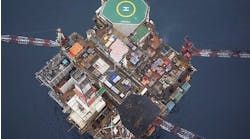Eldon Ball • Houston
In the wake of the Macondo spill and the increase in operating costs and government regulations, the offshore operators most vulnerable to sticker shock at the rising prices and bureaucratic obstacles are the independents.
Independents are less able to absorb higher costs, have fewer resources to deal with the changing regulatory climate, and stake a larger percentage of their profitability on individual projects.
At the same time, their contribution to the E&P vitality of the Gulf of Mexico is mostly overlooked, particularly by high-level economists and policy makers.
A recent study by IHS Global Insight (USA), Inc. examines the role of the independent operators in the GoM, and has some surprising revelations.
The authors analyzed the economic contribution of the independents and potential loss as a result of policies that effectively prevent them from participating in future development in the offshore Gulf of Mexico and, in particular, in the deepwater.
Deepwater activity
Most of us would think of independents as primarily shallow-water operators, with a sprinkling of them in deepwater. But on the contrary, the study noted that:
- Independents are the largest shareholder in 66% of the 7,521 leases in the entire Gulf of Mexico and in 81% of the producing leases
- In the deepwater portion of the Gulf of Mexico, independents are the largest shareholder in 52% of all leases and in 46% of the producing leases. They operate over half of the developing and producing deepwater fields.
- Independents have drilled 1,298 wells in the deepwater, and they currently account for over 900,000 boe/d
- Independents are responsible for an average of 70% of farm-ins – partnerships formed following the original lease agreement that enable prospects to be drilled and oil and gas produced.
Financial impact
Their analysis for the 2009–2020 forecast period indicates that the exclusion of the independents from the offshore GoM would have some debilitating effects, including the following:
Lost jobs in the four-state Gulf region (Alabama, Louisiana, Mississippi, and Texas) – direct, indirect, and induced:
- 2009 – 202,502
- 2015 – 289,716
- 2020 – 300,974.
Additionally, 40,777 construction-related jobs would be lost in the four-state Gulf region during 2009–20. This activity includes construction of rigs, platforms, pipelines, and production facilities.
Lost taxes and royalties to the federal government:
- 2009 – $7.34 billion
- 2015 – $10.13 billion
- 2020 – $9.98 billion.
Lost state and local tax revenues in the four-state Gulf region:
- 2009 – $3.18 billion
- 2015 – $4.59 billion
- 2020 – $4.68 billion
Altogether, more than $147 billion in federal, state, and local revenues would be lost in a 10-year period if independents are excluded from the Gulf of Mexico. These estimates only include revenues collected from the four-state Gulf region.
Deepwater impact
The study found that loss of exploration and development by independents in deepwater areas alone would also make a significant difference in the economy of the region. Their study found, for example, that within the deepwater, the exclusion of the independents would mean the following:
Lost jobs in the four-state Gulf region – direct, indirect, and induced
- 2009 – 121,298
- 2015 – 230,241
- 2020 – 265,113.
Lost taxes and royalties to the federal government:
- 2009 – $3.64 billion
- 2015 – $7.26 billion
- 2020 – $8.33 billion.
Lost state and local tax revenues in the four-state Gulf region:
- 2009 – $1.63 billion
- 2015 – $3.35 billion
- 2020 – $3.94 billion.
Altogether, more than $106 billion in federal, state, and local revenues would be lost in a 10-year period if independents are excluded from the deepwater, according to the study.
Offshore Articles Archives
View Oil and Gas Articles on PennEnergy.com





